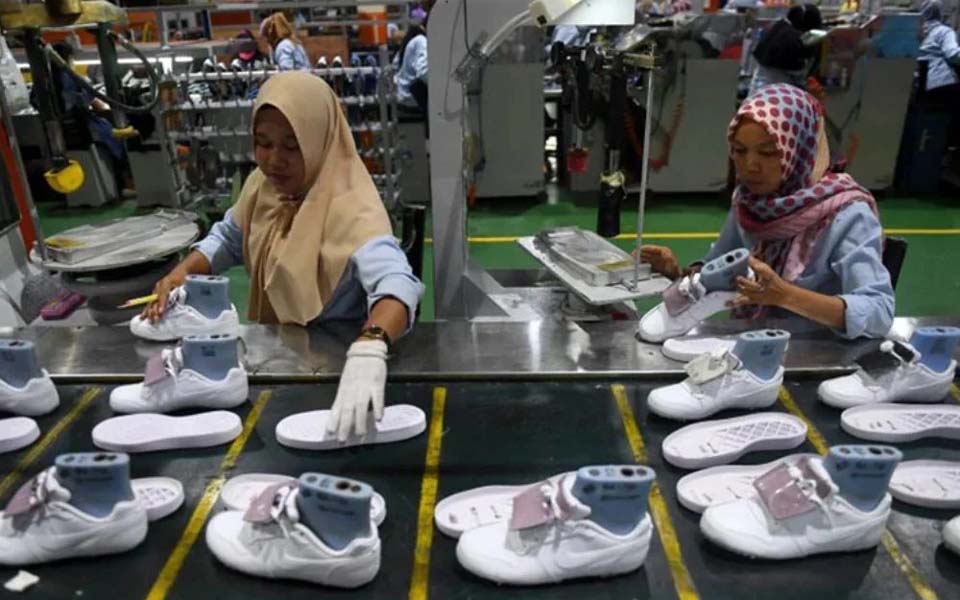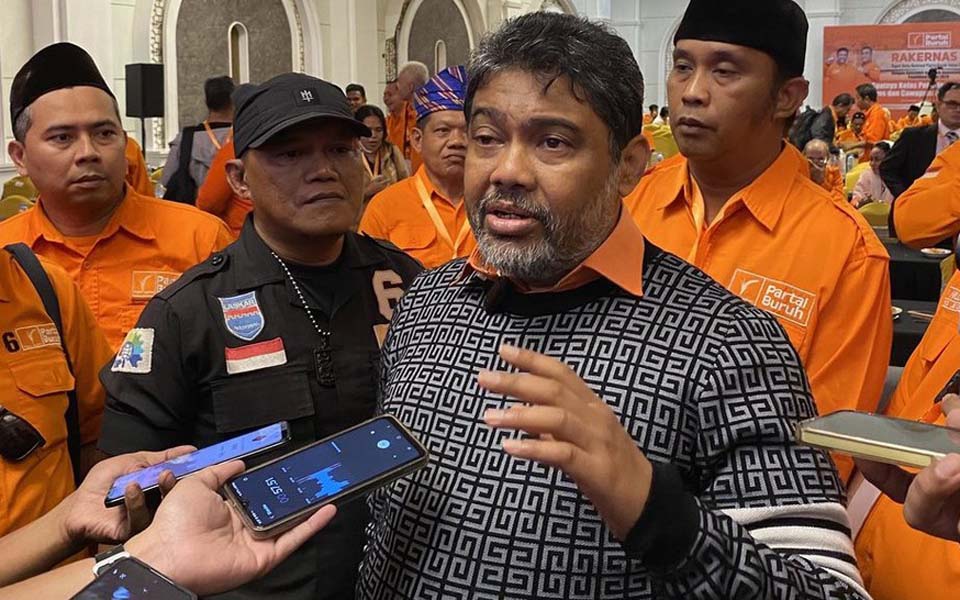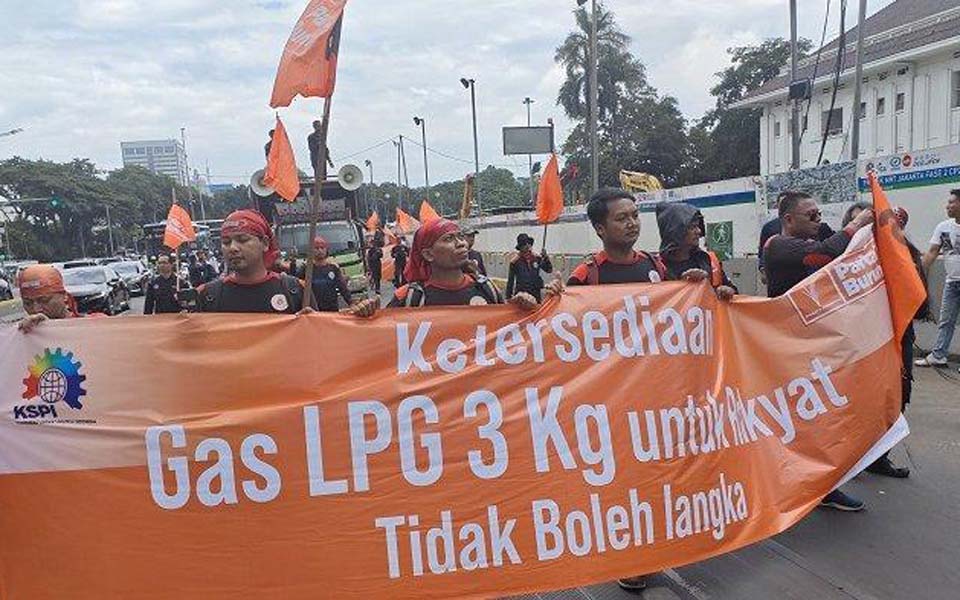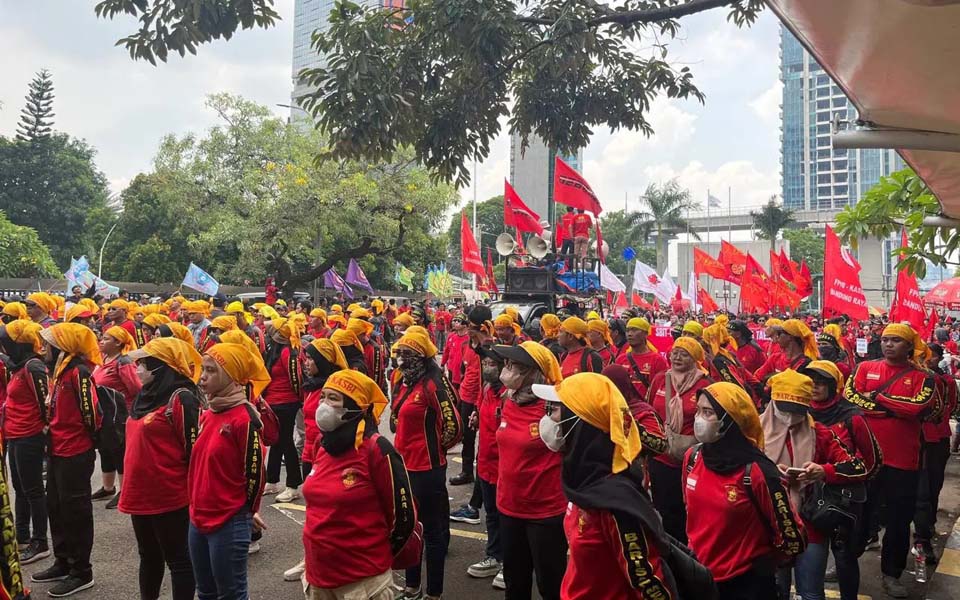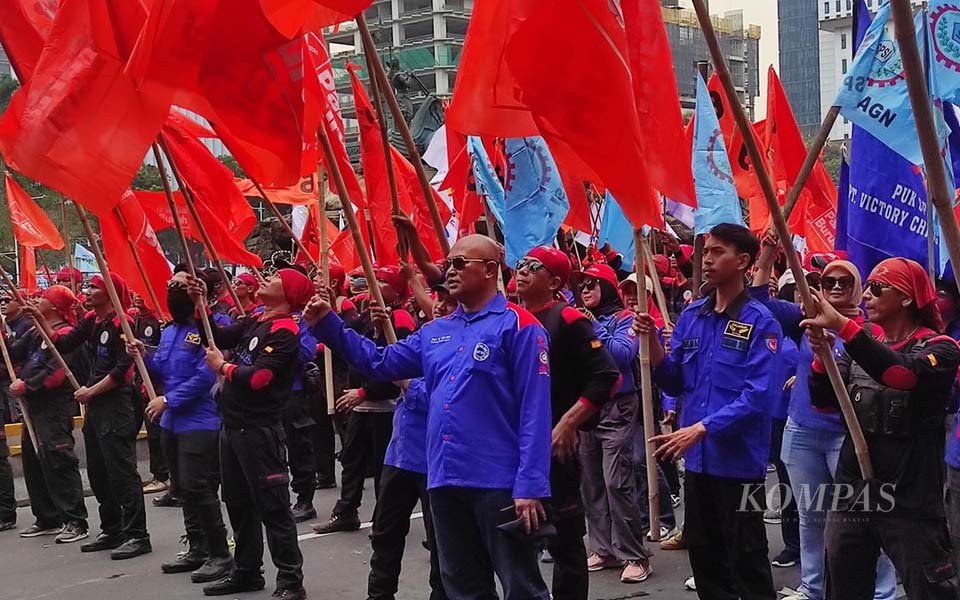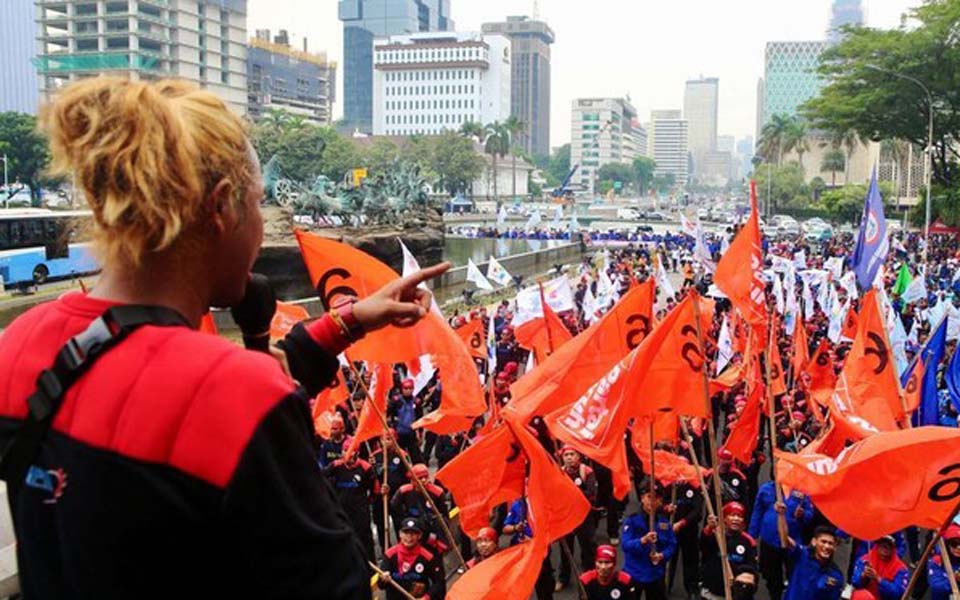International Labour Day 2022 was commemorated by the Labour Party as a "May Day Fiesta" at the Bung Karno Sports Stadium (GBK) in Jakarta on May 14. An estimated 30-60 thousand workers attended the fiesta. Even if the lower estimate of 30,000 is used it shows an increase in mass mobilisations.
In general, previous actions by the Confederation of Indonesian Trade Unions (KSPI) have only been "bluffs" where Labour Party Chairperson and KSPI President Said Iqbal has threatened that tens of thousands of workers would take to the streets, but only a few thousand or even hundred have attended.
Large mobilisations such as this however do not necessarily mean an advance. We also have to pay attention to the content of the mobilisations themselves. They are packaged as "fiestas" – a May Day model usually used by "yellow" trade unions working together with the police to moderate May Day actions.
May Day fiestas are usually filled with non-political events such as dances, recreational walks, bicycle riding and door prizes. It is not uncommon for May Day fiestas to attack other labour protests with posters which denigrate street actions.
Although there were demands such as revoking the controversial anti-worker Omnibus Law on Job Creation, it appears that this was just for publication in the mass media. The May 14 fiesta even invited groups whose interests totally conflict with those of workers, such as Indonesian Chamber of Commerce and Industry (Kadin) and groups whose job it is to destroy the labour movement.
They even made space to convey rotten ideas to the workers. During a protest in front of the House of Representatives (DPR) prior to the GBK rally, an opportunity to speak was given to the Jakarta military commander and Jakarta police chief. Later Indonesian police chief General Listyo Sigit Prabowo was given an opportunity to speak at the GBK.
Of course one of the points in their speeches was an appreciation of how orderly the May Day rally was. And of course they did not mention the deluge of billions of rupiah in money spent on repressing working class resistance to the Omnibus Law – activists' telecommunication devices tapped, hundreds of people assaulted and arrested and the use of live ammunition resulting in the death of two students.
International trade unions were also given an opportunity to present televised speeches. This included trade unions and labour parties from Germany and Brazil. If this is true then it was truly embarrassing for German trade unions and the Brazilian Labour Party and Trade Union confederation. The German working class suffered under the fascist Nazi regime and the Brazilian working class likewise under the ultra-right Bolsonaro regime.
Said Iqbal meanwhile previously supported the 2014 presidential electoral bid by former General Prabowo Subianto – the son-in-law of the military dictator Suharto – who stands accused of involvement in human rights violations and the abduction and disappearance of pro-democracy activists in 1997-98.
The May Day Fiesta shows that the trade union elite bureaucracy is increasingly holding workers hostage though mass mobilisations with a backward consciousness.
It also shows that the trade unions which claim to be "red" such as the Confederation of United Indonesian Workers (KPBI) – which is made up of the Indonesian United Trade Union Federation (FSBPI), the Populist Trade Union Federation (SERBUK), the Solidarity Alliance for Labour Struggle (GSPB), the Indonesian Pulp and Paper Trade Union Federation (FSP2KI), the Food and Beverage Trade Union Federation (FSBMM), the National Industrial Trade Union (SPIM), the Financial Services Trade Union (SPJK) and the State Electricity Company Trade Union (SP-PLN), along with the National Labour Movement Centre (SGBN) – are being progressively sidelined, or are moving towards becoming yellow trade unions.
Yellow trade unions
On October 4-5, 2021 the Labour Party held a congress in Jakarta. Aside from the leadership of the old Labour Party established by the late Mochtar Pakpahan in 1998, it was supported by the KSPI, the Indonesian Confederation of Prosperity Labour Unions (KSBSI), the Indonesian Metal Trade Workers Federation (FSPMI), the Confederation of the All-Indonesian Workers Union (KSPSI) led by Andi Gani, the Confederation of United Indonesian Workers (KPBI), the Energy and Mining Labour Solidarity Forum (FSP KEP), the Health and Pharmaceuticals Trade Union Federation (FSP Farkes), the Indonesian Private Sector Honorary Teachers and Educators Forum (FPTHSI) and the Indonesian Labour Movement (GPI). The SGBN also declared its support following the congress. From this structure it can be seen that the party is dominated by the yellow trade union elite bureaucracy from the KSBSI, KSPI, FSPMI and KSPSI Andi Gani.
The Labour Party's vision is of a prosperous country with 13 platforms of struggle, namely the people's severity, employment opportunities, corruption eradication, social welfare, food, fish and livestock sovereignty, decent wages, fair taxes for the people's welfare, industrial relations, the environment, human rights and traditional communities, the protection of women and children, the empowerment of people with disabilities, protecting and promoting honorary workers to become state civil servants and improving their welfare and strengthen cooperatives, state-owned enterprises and the private sector as the main pillars of the economy.
A labour party made up of these yellow trade unions and organisations will of course be reformist. And although we must go beyond capitalism, we must also look at what can be accepted and what objectively is being faced by the working class and oppressed people at the moment. With a program of urgent and democratic demands the working class can gain broad the support from working people and the oppressed.
The main problem with the Labour Party's vision and platform of struggle is its lack of clarity. It does not clearly articulate the interests of the working class and oppressed people.
When will the Labour Party call for the arrest and seizure of the corruptors' and the tax cheats' assets, which of course would include the hidden assets of Defense Minister Prabowo Subianto, Tourism and Creative Industries Minister Sandiaga Uno, Coordinating Minister for Maritime Affairs and Investment Luhut Binsar Pandjaitan, Economic Minister Airlangga Hartarto and others.
Perhaps also a call for the arrest and trial of Prabowo, Suharto era armed forces commander Wiranto and former State Intelligence Agency (BIN) chief AM Hendropriyono and the other generals for the crimes against humanity that they have masterminded.
We also need free education and healthcare, not a health system paid for by contributions by workers and the ordinary people themselves. Perhaps also agrarian reform to meet the demands of farmers for land.
And what about separating religion from politics and the state by for example disbanding the Religious Affairs Ministry and stopping government funding for the peak Islamic body the Indonesian Ulama Council (MUI) or other religious institutions, while of course guaranteeing freedom of religion and beliefs for the ordinary people including the Syrah and the Ahmadiyah religious groups.
What about also abolishing militarism by disbanding the territorial military command structure and ending all military operations in Papua. And what about defending our democracy by abolishing all legal instruments which undermine free speech such as the draconian Information and Electronic Transaction (ITE) Law.
It is also very important in such a democratic program to show resistance against the bourgeois regardless of which political party backs them. This is what will create a working class identity which can only be meaningful if they understand that their class interests conflict with those of the bourgeois.
History of collaboration
The trade union bureaucratic elite has a long history of collaborating with the various bourgeoisie factions which exist.
The first National Strike in 2012 – the first since Suharto's military regime sized power in 1965 – was stopped unilaterally by Said Iqbal on the first day. Iqbal held negotiations with the Labour Minister and asked that the national strike be stopped. The result was far from what had been hoped for – just a ministerial regulation limiting outsourcing to five job sectors.
During plans for the second National Strike in 2013, the KSPSI and KSBSI in fact deflated and attacked the labour movement by declaring the Anti-Violence Movement (GEBRAK) which equated violence by thugs with the national strike by workers. The second National Strike was postponed several times and the KSPI changed the call from a "national strike action" to a "national protest action".
The third National Strike in 2014 failed because it was replaced by a national protest action. And that action itself was halted by KSPSI President Andi Gani on the grounds that he had received a phone call from President Joko "Jokowi" Widodo, who pledged that workers would be involved in the drafting of the 2015 state budget and that an economic team would be formed to look into workers' living costs.
Factory occupations were stopped by the Harmony Declaration on November 8, 2012 which was signed by the Bekasi Investors' Forum, the provincial and regional governments, reactionary civilian militia groups and the trade union leaders Obon Tabroni (FSPMI), R Abdullah (the All Indonesian Workers Union, SPSI), Joko Tugimin (the National Trade Union, SPN) and Sepriyanto (Association of Indonesian Independent Manufacturing Trade Unions, GSPMII). The Harmony Declaration was also used to break up labour protests.
The character of these yellow trade unions' political struggle can also be seen from their concept of "Go Politic". Initially, Go Politic was to support trade union members who joined any of the existing political parties – be they the Golkar Party, Prabowo's Greater Indonesia Movement Party (Gerindra) or President Widodo's ruling Indonesian Democratic Party of Struggle (PDI-P) – without consideration of the ideology of these parties.
This then developed into the KSPI supporting the Prabowo, Gerindra and Justice and Prosperity Party (PKS) coalition while the KSPSI and the KSBSI supported Widodo and the PDI-P. Discussions about establishing a mass based labour party in 2012 were in the end betrayed.
The human rights violations committed by Prabowo were justified by Iqbal by saying, "Prabowo is said to have human rights issues, but workers don't relate to this so it's rather difficult to link it with workers".
Iqbal then spread racist hatred against Chinese workers and in 2016 joined the National Movement to Safeguard the Indonesian Ulema Council's Fatwa (GNPF-MUI) in the 212 Defend Islam Actions to oust Christian-Chinese governor Basuki "Ahok" Tjahaja Purnama, although this was done under the name of the Indonesian Employees Movement.
In the lead up to the 2017 Bekasi regional elections, Obon Tabroni called for the situation to be "conducive". Meaning that for the sake of the election process labour resistance had to be controlled. Meanwhile workers who were elected to parliament such as Tabroni and Nyumarno did an about turn and supported the anti-worker and widely unpopular Omnibus Law on Job Creation.
Decline in mobilisations
Likewise also when we listened to the Labour Party declaration read out by Iqbal. Like some kind of prophet, he (and it was hoped all trade union leaders) would become the saviors of the ordinary people. They would shoulder the people's suffering, make a great effort to build the party and fight for the ordinary people's future. But based on experience, electoral intervention by the FSPMI and KSPI has replaced mass mobilisation or efforts to radicalise the masses.
In concert with the decline in the labour movement and the counter-attack against resistance by workers and students to the Omnibus Law, the capacity of the yellow trade unions to launch mobilisations also declined.
The other factor in the decline of mass mobilisations was the perspective of the trade union bureaucratic elite who saw mobilisations not as the principle means of struggle but as a tool to strengthen their lobbying and bargaining position.
It is also important to look at the three main components behind the formation of the Labour Party which have a different and even conflicting histories. These historical difference could become a problem in the future unless the KPBI or the SGBN further accommodate the maneuvers by the yellow trade union bureaucratic elite.
The KSPSI and the KSPI have their roots in the SPSI, which was controlled by the Suharto military regime. The KSBSI meanwhile, played an important political role in resisting the Suharto regime – although it was only as a way to boost their bargaining position to negotiate for better wages and workers' welfare.
On the other hand, trade unions like the KPBI or even the SGBN can be traced back to the ranks of the People's Democratic Party (PRD) affiliated Indonesian Center for Labour Struggle (PPBI), which in its early stages saw the end of the Suharto regime as opening up democratic space where labour politics, including socialism, would find more freedom. Mass mobilisations was the means to realise this political struggle.
Meanwhile elements of the organised working class which are at the forefront of mobilisations, such as the Indonesian Trade Union Congress Alliance Confederation (KASBI), the Populist Democratic Trade Union Federation (F-SEDAR), the Militant Trade Union Federation (FSEBUMI) and so forth, have yet to issue an official statement on their position towards the Labour Party. Several however were prepared to speak to Arah Juang.
Rangga, from the central leadership of the Indonesian Workers Federation of Struggle (FPBI) declared that the Labour Party cannot yet be said to be an alternative because it was born out of meetings by the labour movement elite.
Ilham Jimbo meanwhile, from the FSEBUMI's research and development department, views the Labour Party as not being initiated by working class political consciousness and also not being free of reformist elements who will capitulate before the bourgeois.
The grip and maneuvers of the trade union bureaucratic elite can be broken through the radicalisation of the mass of working people. That is why for revolutionaries joining a labour party is a tactical problem which very much depends on the level of radicalisation of ordinary working people themselves.
Unfortunately, the objective situation does not support this at present. Although over the last two years a new radicalisation has emerged, it is spontaneous in character and revolutionary forces are still small.
And up until now there has yet to be any alternative political force of significant to challenge the trade union bureaucratic elite. The large majority of activists are still confined by trade unionism itself or advocacy work.
The struggle to build an alternative (revolutionary) party is a long and difficult road. But it is not something which is impossible. The advanced elements within the trade unions and people's movement must join together and build a revolutionary party, and go beyond trade union workerism and advocacy.
- Labour Party welcomes top cop's attendance at May Day Fiesta 2022
- Labour Party to prioritise elections, parliamentary struggle over street protests
[Translated by James Balowski from an edited and updated article by Cross Communal member Musa Talutama. The original article published by Arah Juang on November 2, 2021 by Socialist Union leader Dipo Negoro was titled "Partai Buruh – Alat Politik Rakyat Pekerja atau Elit Birokrasi Serikat Buruh?".]







